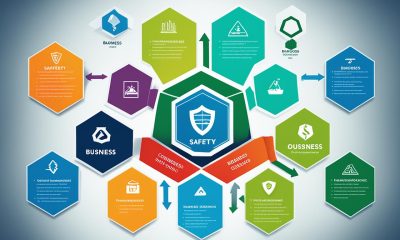Maximize Wealth with Expert Personal Finance Tips
Want to control your money and secure a better future? Expert personal finance tips can show you how. With the right budgeting skills, money-handling advice, and financial planning, you can grow your wealth. This leads to a brighter, more secure future.
- Financial planning advice plays a vital role in building a solid financial foundation.
- Effective budgeting enables you to track expenses and make informed spending decisions.
- Smart saving techniques contribute to future financial stability.
- Investing wisely is crucial for long-term wealth accumulation.
- Implementing expert personal finance tips can unlock your financial potential.
Developing a Solid Financial Plan
Creating a solid financial base means making a good plan. Managing your money well and setting goals help build a future roadmap. This keeps you on track.
Getting financial planning advice means considering things like income, expenses, and long-term goals. It’s important to have a plan that fits your life.
Here are some tips to reach financial success:
- Assess your current financial situation: Look at your income, expenses, debt, and savings. Knowing your current state helps you make smart choices.
- Set realistic financial goals: Create attainable short-term and long-term goals. This could be for a house, education savings, or retirement. Clear goals motivate and guide you.
- Create a budget: Keep track of your income and spending. Budgeting helps you focus your spending, save, and cut out what you don’t need.
- Establish an emergency fund: Save for surprises by putting aside some income. Try to save enough to cover three to six months of expenses. This safety net is key in tough times.
- Diversify your investments: Don’t rely on just one investment. Spread your savings to lessen risk and potentially earn more. Get advice from financial advisors or use planning tools.
Improving your financial literacy is key:
- Financial literacy websites: Sites like Investopedia and The Balance have detailed articles and lessons on money topics.
- Books on financial planning: Read books like “The Total Money Makeover” by Dave Ramsey or “Rich Dad Poor Dad” by Robert Kiyosaki. They offer great insights on managing money and building wealth.
- Finance podcasts: Personal finance shows like “The Dave Ramsey Show” or “ChooseFI” are great for learning from experts and hearing success stories.
- Online courses: Use Coursera and Udemy for personal finance and investing courses. Learn at your speed.
Using these finance tips and resources can help you make a strong plan. This leads to financial security and growing wealth.
Mastering the Art of Budgeting
Learning how to budget is key for anyone who wants to live financially healthy. It lets you keep track of your money, focus on your financial aims, and spend wisely within your means.
Essential Budgeting Tips
Here are some top tips to become great at budgeting:
- Begin with your income and spending: First, figure out your monthly income. Then, note all expenses. This includes fixed costs (like loans or utilities) and changing costs (like food or fun activities).
- Make a budget: Use tools like spreadsheets or apps to build a budget. This should list your income and expenses. Set a specific amount for every type of expense to help you stay on path.
- Define your financial goals: Think about your financial aims, both near and far, such as purchasing a home, eliminating debt, or saving for emergencies. Part of your budget should go to these goals.
- Monitor your expenses: Regularly check your spending to make sure you’re following your budget. If you’re spending too much somewhere, find ways to reduce that spending.
- Save automatically: Set up your bank account to automatically move money to savings. Treat savings like it’s just another monthly bill.
Money Management Strategies
Good money management can help boost your financial security. Here are some effective strategies:
- Focus on high-interest debt: Work on paying off debt that comes with high interest first, like credit card debt. Cut down on non-essential spending to free up more money for repaying debt.
- Build an emergency fund: Set money aside each month for emergencies. Try to save enough to cover expenses for three to six months.
- Invest smartly: Look into investments to increase your wealth over time. Learn about different investment options and get professional advice when necessary.
- Spend with care: Think about whether a purchase fits your financial goals and if it’s truly needed. Avoid buying things on impulse and focus on the value it will bring in the long term.
- Keep learning about finance: Always try to learn more about personal finance, including topics on retirement, taxes, and investments. Stay current with the latest financial news and advice.
Smart Saving Techniques for Future Financial Stability
Saving money is key for future financial stability. It’s more than just putting money aside. Using smart strategies, you can boost your savings and reach your financial goals smoothly.
The Power of Automation
Automating your savings is a powerful strategy. Set up automatic transfers from your checking to savings account. This way, you save without even thinking about it. It guarantees regular savings and stops you from spending that money elsewhere.
Setting Achievable Savings Goals
Setting realistic savings goals is another effective technique. Look at your budget to decide how much to save monthly. Whether it’s a set amount or a part of your income, clear goals keep you focused and motivated.
Even small savings add up over time. Stay consistent. Celebrate your successes and increase your savings when you can.
Making Wise Investment Choices
Beyond saving, consider making smart investments. Talk to a financial advisor or research to find investments that suit your goals and risk level.
Investments like stocks, bonds, and real estate could grow your savings faster. Make sure to understand the risks and spread your investments to reduce losses.
Use these techniques, like automating savings, setting clear goals, and investing wisely, to boost your savings. These strategies can help grow your wealth and ensure your financial future. Start now and see your money grow over time.
Making Informed Investments for Long-Term Growth
Investing wisely is crucial for growing your wealth over time. It involves making choices that best fit your financial plans. This section offers tips and guidance for making those smart investment decisions.
Our advice aims to help you understand the investment world better. This way, you can invest confidently and build a strong financial future.
Understanding Different Investment Options
Knowing your investment options is key. Each choice, like stocks, bonds, real estate, and mutual funds, has its own set of benefits and risks. Getting to know these options can help you diversify your investment portfolio for better returns.
Think about what you’re comfortable with and your financial goals when choosing where to invest. Understanding these aspects is vital for successful investing.
Assessing Risk Tolerance
It’s important to understand how much risk you’re willing to take before investing. Your risk tolerance affects which investment strategies will work best for you. Some people are okay with a steady, low-risk return, while others might prefer the chance of higher rewards despite more risk.
To figure out your risk tolerance, consider these questions:
- How much money am I willing to potentially lose?
- Am I comfortable with short-term market volatility?
- What are my long-term financial goals?
- How soon do I need to access the invested funds?
Diversifying Your Portfolio
Diversification is key for minimizing risk and maximizing growth. It means spreading out your investments to avoid big losses. You can diversify by investing in different asset types, like stocks, bonds, and real estate.
Keep these points in mind when diversifying:
- Diversify across different asset classes (stocks, bonds, real estate, etc.).
- Consider diversifying within each asset class (large-cap, small-cap stocks, etc.).
- Don’t put all your eggs in one basket; spread your investments across multiple sectors and geographic regions.
Making smart investments requires thought, monitoring, and sometimes changes to your plan. Stay up-to-date with market trends and seek advice when necessary. By following good investment advice, you can build a strong portfolio that supports your financial future.
Pros and Cons of Different Investment Options
| Investment Option | Pros | Cons |
|---|---|---|
| Stocks | Potential for high returns Opportunity to own a stake in companies |
Highly volatile Can be subject to market fluctuations |
| Bonds | Relatively stable returns Lower risk compared to stocks |
Lower potential returns Interest rate risk |
| Real Estate | Potential for appreciation and rental income Diversification from financial assets |
Requires significant initial investment Maintenance and management responsibilities |
| Mutual Funds | Instant diversification Professional management |
Management fees Cannot individually select investments |
| ETFs | Low expense ratios Can be traded like a stock |
Brokerage fees Market volatility |
Conclusion
Using expert money tips can unlock your financial future. These tips include managing money well, budgeting, saving, and smart investing. With these methods, you can secure financial stability and a wealthy future.
Having a detailed financial plan is like having a roadmap. It helps you succeed with money. By budgeting well and saving wisely, you can manage spending, focus on goals, and build a strong financial base.
Smart investing choices can really grow your money over time. Diversifying investments, understanding risk, and keeping up with market trends are key. They help you invest confidently and increase your chances of financial success.
FAQ
What are some personal finance tips for maximizing wealth?
Why is developing a solid financial plan important?
What are some budgeting tips for effective money management?
How can I save money effectively for future financial stability?
What are some investment guidance and personal finance tips for long-term growth?
-

 Financial Education11 months ago
Financial Education11 months agoEmpowering Your Future with Financial Education
-

 Financial Education11 months ago
Financial Education11 months agoBoost Your Credit Score Improvement Tactics Now
-

 Financial Market11 months ago
Financial Market11 months agoRisk Assessment Strategies for Business Safety
-

 Financial Market11 months ago
Financial Market11 months agoEssential Guide to Economic Indicators 2023
-

 Financial Market11 months ago
Financial Market11 months agoMaximize Wealth with Smart Investment Strategies
-

 Financial Market11 months ago
Financial Market11 months agoSmart Retirement Planning Strategies for You
-

 Credit Cards11 months ago
Credit Cards11 months agoEssential Fraud Protection Strategies for Security
-

 Financial Market11 months ago
Financial Market11 months agoStrategic Asset Allocation Guide for Investors

